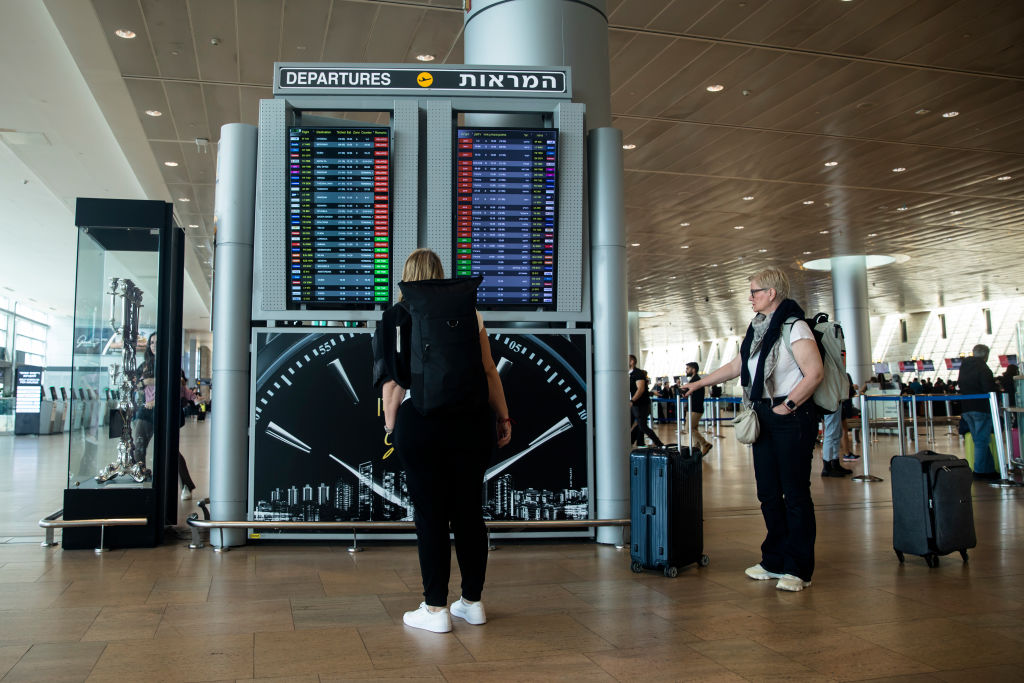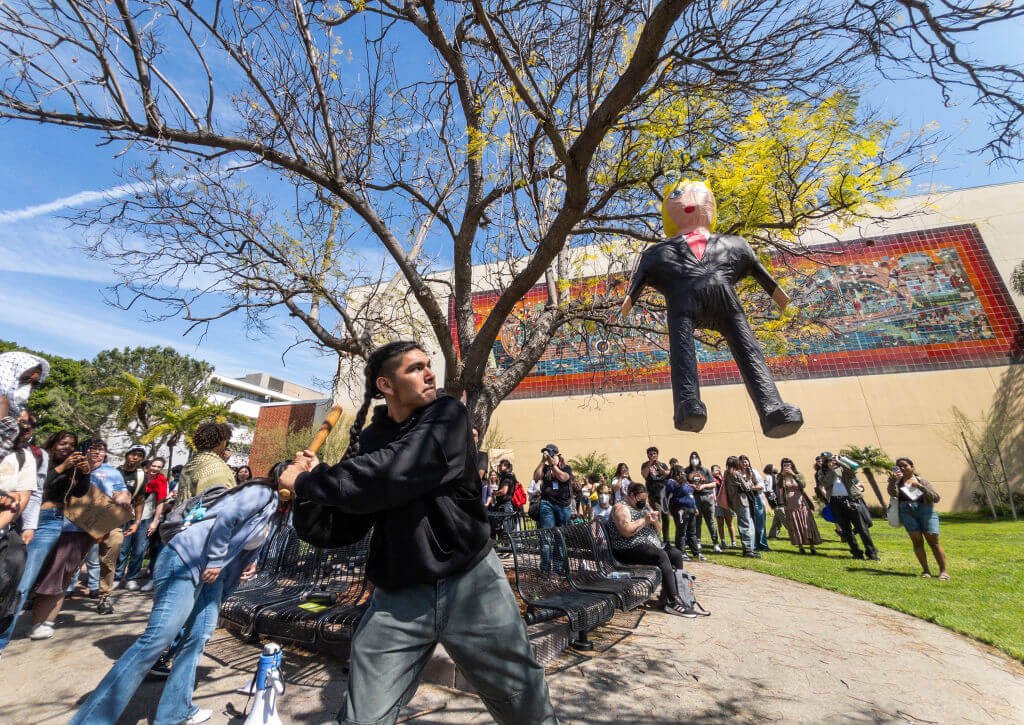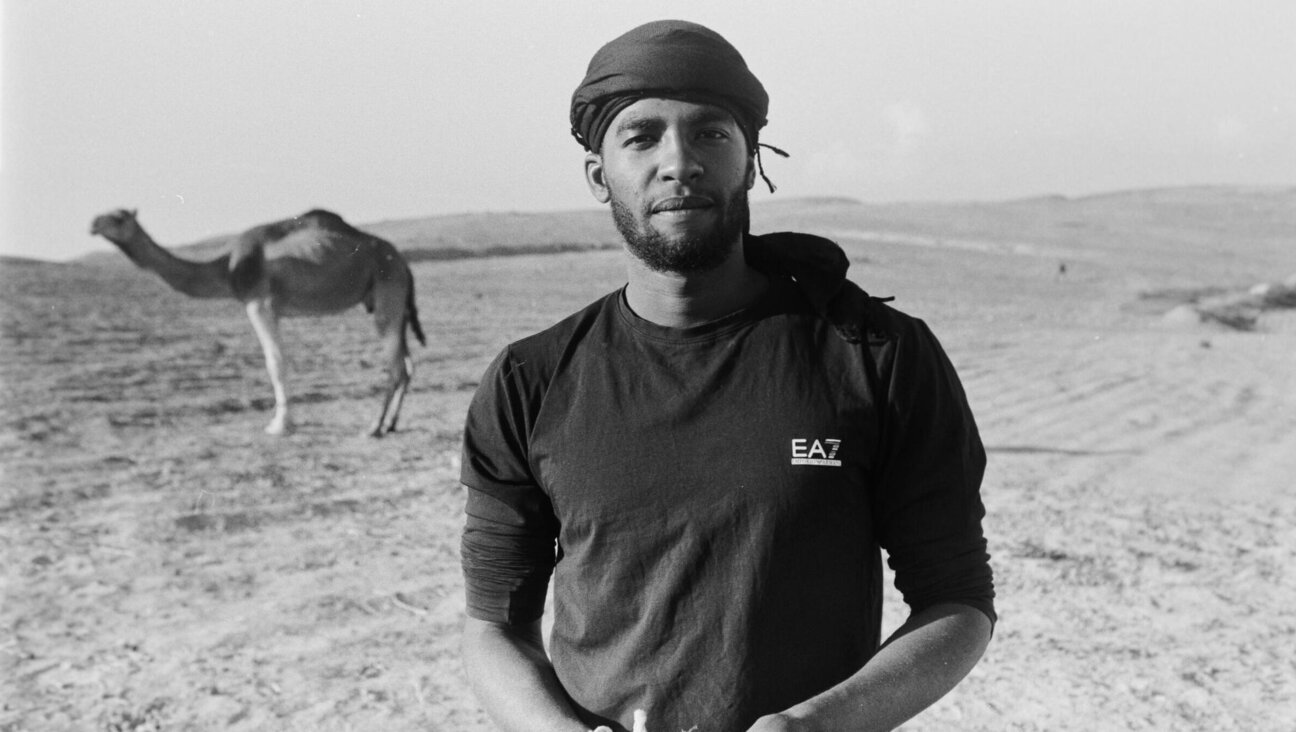This article is part of our morning briefing. Click here to get it delivered to your inbox each weekday. After massive protests overnight, a national strike gripped Israel Monday morning: No flights departed Ben Gurion airport, schools and universities canceled classes, non-emergency care at hospitals were suspended, shopping malls closed their doors and hundreds of thousands of people filled the streets. Some mayors called for a hunger strike. McDonald’s closed its 200 stores in Israel in solidarity. Israeli news outlets reported this morning that Prime Minister Benjamin Netanyahu would announce a freeze on the judicial overhaul legislation. But it appears that announcement has been delayed after Itamar Ben Gvir, the extremist national security minister, has threatened to quit the government. Monday’s crisis followed an intense weekend, in which Prime Minister Benjamin Netanyahu fired his defense minister, Yoav Gallant, after he called for a halt to the legislation.
“We are deeply concerned by today’s developments out of Israel,” the White House said in a statement. “Democratic societies are strengthened by checks and balances, and fundamental changes to a democratic system should be pursued with the broadest possible base of popular support.” |
Mounted police officers ride past protesters Monday in Jerusalem. (Getty) |
Israel’s top diplomat in New York quits: Consul General Asaf Zamir announced his resignation Sunday in response to Gallant’s firing. “I can no longer continue representing this government,” Zamir said. In a letter to area rabbis and other leaders, he wrote: “The political situation in Israel has reached a critical point, and I feel a deep sense of responsibility and moral obligation to stand up for what is right and to fight for the democratic values that I hold dear.” Read the story ➤ Opinion | A fierce Israel critic’s predictions ring true: Thirteen years ago, columnist Peter Beinart accused mainstream American Jewish leaders and organizations of turning a blind eye to Israel’s occupation of the West Bank and abetting its descent into an undemocratic, illiberal state. There was a chorus of criticism, but with the current turmoil in Israel proving Beinart’s prescience, does he feel vindicated? Our Rob Eshman asked him. Read the essay ➤ Opinion | We led the daring Entebbe hostage rescue. Now we’re fighting Israel’s judicial overhaul: The team of men who led the 1976 counter-terrorist rescue mission have generally eschewed public attention. Their commander, Yonatan Netanyahu, was killed during the raid. Now, they are standing up against his brother’s plan to limit judicial authority. “Israel is in peril,” they write, “and the enemy, this time around, is domestic.” Read their essay ➤ “It’s a very, very dangerous situation”: Read an Israeli journalist’s key takeaways from the recent protests. Why are so many former Israeli generals opposing the judicial overhaul? Michael Koplow of Israel Policy Forum breaks it down. |
Myrna Frank holds a poster of Theodor Herzl, the father of modern Zionism, shedding a tear. (Lauren Markoe) |
Protests in the U.S.: The speeches were in English, but the chatter among the crowd in New York’s Washington Square Park on Sunday was almost exclusively in Hebrew: Most of the several hundred people protesting Israel’s current government were Israeli immigrants or visitors. They held signs comparing Netanyahu to dictatorial rulers like Vladimir Putin of Russia and Victor Orban of Hungary, as well as one calling him CRIME MINISTER. Another protest on Sunday took place outside the Israeli embassy in Washington, D.C. The crowd of about 200 waved Israeli flags, sang Hatikvah and other Israeli songs. Among those gathered was Myrna Frank, 72, who was born in South Africa, made aliyah and now resides in Silver Spring, Maryland. “This is not the Israel I believe in,” she said. Standing nearby was Shai Cohen, 67, of Rockville, an IDF veteran who served in the Air Force, who has both American and Israeli citizenship. “I fear losing Israel to fascism and dictatorship,” he said.
Read our complete coverage of the Netanyahu’s judicial overhaul. |
The campaign by Robert Kraft is the most expensive entry in a growing field of ads condemning antisemitism. (Getty) |
Is $25 million in TV ads the best way to fight antisemitism? In what may be the most ambitious public awareness campaign about American antisemitism since the 1950s, Robert Kraft, the billionaire Jewish businessman, plans to spend $25 million flooding television airwaves with wrenching depictions of hatred against Jews. The goal is for every American adult to see the ads at least 10 times over the next six weeks. Our enterprise reporter Arno Rosenfeld breaks down the campaign, part of a boom in such ads whose effectiveness is unclear. Gut punch: The ads featuring emotional scenarios will debut Monday night during The Voice, a popular singing competition on NBC. Directed by Derek Cianfrance, who made the film Blue Valentine, one focuses on a young girl who sees a swastika painted on her family’s garage, while another shows a teenage boy whose bar mitzvah video is assailed by trolls on social media. Stretching stats: The scenes conclude with statistics meant to emphasize the scale of antisemitism. For example, that 70% of American Jews “faced” antisemitism online last year; the survey that number comes from said that 13% were the target of such vitriol, and the rest saw something antisemitic online. “Not all antisemitic incidents are to the level of what we describe in our videos,” acknowledged the head of Kraft’s antisemitism group, “but I believe everyone in the Jewish community is fearful that they’re the next target.” Tactic questioned: Kraft, whose net worth is estimated at $7 billion, is one of several philanthropists underwriting ad campaigns targeting hate. But some worry this approach could backfire by setting Jews apart from other targeted groups, or making them more afraid. “We don’t have people who are asking, ‘Hey, is this a good strategy?’” said Jonathan Sarna, a scholar of American Jewish history. Read the story and watch the ads ➤ |
Spread the word! Invite someone
to sign up for this newsletter.? |
WHAT ELSE YOU NEED TO KNOW TODAY |
Kanye West claims to have changed his mind about Jews. (Getty) |
? Kanye West announced on Instagram Saturday that he now likes Jews, after seeing Jewish actor Jonah Hill in the 2012 comedy 21 Jump Street. “No one should take anger against one or two individuals and transform that into hatred towards millions of innocent people,” West wrote. The Anti-Defamation League’s Jonathan Greenblatt was nonplussed. “This is ridiculous and not remotely serious,” Greenblatt posted on Twitter, adding that if West wants to make amends, “it’s a long road and he hasn’t even started the journey.” (JTA, Twitter) ⚖️ The man charged with killing 11 people during Shabbat services at Pittsburgh’s Tree of Life synagogue in 2018 is finally set to go to trial on April 24. Our colleagues at the Pittsburgh Jewish Chronicle spoke with legal experts about the trial, which is expected to last three months. (PJC) ? A parent opposed to Utah’s new law allowing schools to ban any book with “pornographic or indecent” content submitted an official request for a district to remove the Bible. After all, they noted, it contains “incest, onanism, bestiality, prostitution, genital mutilation, fellatio, dildos, rape, and even infanticide.” (Salt Lake Tribune) ?️ A teen whose Jewish high school doesn’t have a golf team plays at a nearby Lutheran school, whose team name is the Crusaders. It “feels a little bit weird,” said the golfer, Boaz Exodus Ginzburg, a two-time Private School Athletic Association Champion. (JTA) ? During the Civil War in 1862, 20 Jewish Union soldiers who were camped in the mountains of West Virginia had a Seder on Passover. On April 3, the Civil War Trails program is set to unveil a sign at the spot where it took place. (WVNSTV) What else we’re reading ➤ Amid rise in antisemitism, Yeshiva University focuses on Holocaust education … A Missouri church leader claims prayer regrew a woman’s toes, but others are skeptical … How an encounter with Guillermo del Toro led to New York City’s first Mexican Jewish Film Festival. |
Sunday, April 2, 3 p.m. ET, Museum of Jewish Heritage: What was it like to be among the first to tell the story of Anne Frank? Eva Rubinstein and Steve Press, who were in the original Broadway production, and Pauline Hahn, who starred in an early national tour, will talk about how the play changed their lives with Adam Langer, host of our podcast on the subject. Register here to attend in person or online ➤ On this day in history (1914): Dr. Albert Hustin performed the first-ever blood transfusion, in Brussels. Many have questioned whether transfusions — and organ donation — are permissible according to Jewish law, given the Torah’s prohibition against self-mutilation. However, the practice has been widely embraced, under the concept of pikuach nefesh, valuing saving a life over other commandments. |
It’s not every day you see a Hasidic weatherman. Nissim Black, an Orthodox rapper, delivered the weather report on a local South Carolina news station while he was in town for a concert at Furman University. |
- First we debated latkes vs. hamantashen. Now comes matzah vs. matzo. Why does the Forward — along with other publications, the purveyors of unleavened bread and, apparently, millions of people who use Google — stick with ye olde fashioned spelling? Our editor-in-chief, Jodi Rudoren, explains.
- A blowtorch-wielding rabbi, the ADL’s new partnership with the United Arab Emirates, and car washes discriminating against Orthodox Jews. How well have you been keeping up with Jewish headlines? Take our news quiz to find out.
— Thanks to Tani Levitt, Jacob Kornbluh, Lauren Markoe, Arno Rosenfeld, Jodi Rudoren and Talya Zax for contributing to today’s newsletter. You can reach the “Forwarding” team at [email protected]. |
|

























